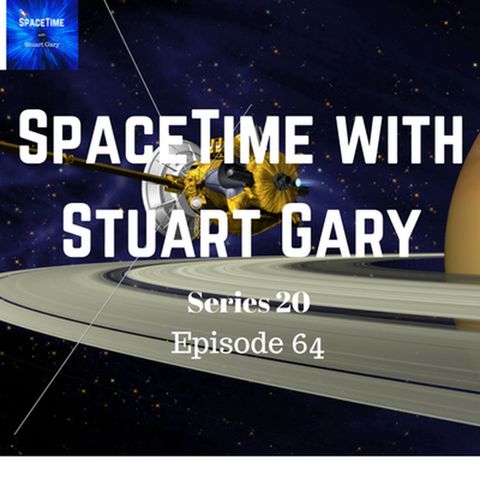64: Galaxies at the cosmic dawn

Aug 16, 2017 ·
36m 58s
Stream episodes on demand from www.bitesz.com (mobile friendly) * Galaxies at the cosmic dawn Astronomers have peered back to the dawn of time -- discovering 23 young galaxies, seen as...
show more
Stream episodes on demand from www.bitesz.com (mobile friendly) * Galaxies at the cosmic dawn Astronomers have peered back to the dawn of time -- discovering 23 young galaxies, seen as they were just 800 million years after the Big Bang. The findings reported in the Astrophysical Journal represent one of the deepest ever observations into the 13.8 billion year old universe. *Cassini begins its final orbits around Saturn NASA's Cassini spacecraft has entered new territory in its final mission phase, the grand finale, as embarks on a set of ultra-close passes through Saturn's upper atmosphere with its final five orbits around the ringed world. Cassini completed the first of these five passes over Saturn on Monday. *The ancient Earth was a water world A new analysis of mineral grains indicates that the ancient Earth was most likely a water world -- barren, flat, and almost entirely under water with only a few small islands sticking out above the surface. The findings are based on a study of 4.4 billion year old zircon mineral grains preserved in sandstone rocks in the Jack Hills of Western Australia – which are among the oldest fragments of the Earth ever found. *High velocity stars speeding through the galaxy Astronomers using the European Space Agency’s Gaia satellite have discovered six high velocity stars that appear to have been flung out from the galactic centre by close encounters with the Milky Way’s supermassive black hole. The findings reported in the Monthly Notices of the Royal Astronomical Society could provide scientists with key information about some of the most obscure regions of the Milky Way galaxy. *Astronomers revised their projections about asteroid 2012 TC4 An asteroid which could have missed the Earth by as little as 6800 kilometres will now fly by the planet at a more comfortable distance of 44 thousand kilometres. The 15 to 30 metre wide space rock will pass the Earth on October 12. *The Science Report It’s official, 2016 was the hottest year on record, and climate change caused by anthropological greenhouse gas emissions is to blame. New study finds increasing vitamin B3 intake dramatically reduce the risk of miscarriage and multiple births defects. Humans may have left Africa and arrived in Southeast Asia 20,000 years earlier than previously thought. A new record for fastest light pulse. A new study into the domestication of the modern dog. Subscribe, rate and review SpaceTime at all good podcasting apps…including iTunes, Google Podcasts, Stitcher, Pocketcasts, Podbean, Radio Public, Tunein Radio, google play, etc. If you're enjoying SpaceTime, please help out by sharing and telling your friends. The best recommendation I can get is one from you. Thank you... #astronomy #space #science #technology #news #astrophysics #NASA #cassini Learn more about your ad choices. Visit megaphone.fm/adchoices
See acast.com/privacy for privacy and opt-out information.
show less
See acast.com/privacy for privacy and opt-out information.
Information
| Author | bitesz.com |
| Website | - |
| Tags |
-
|
Copyright 2024 - Spreaker Inc. an iHeartMedia Company
